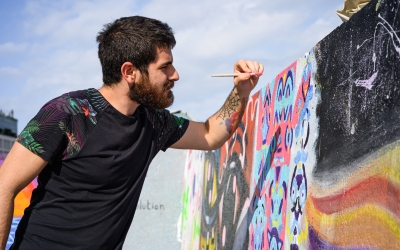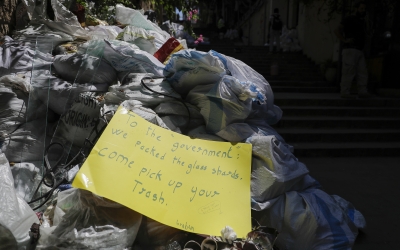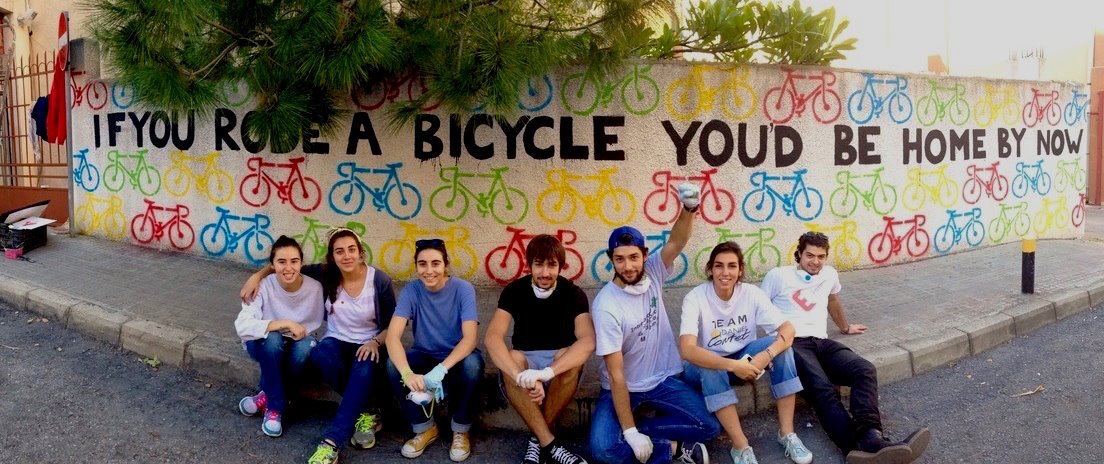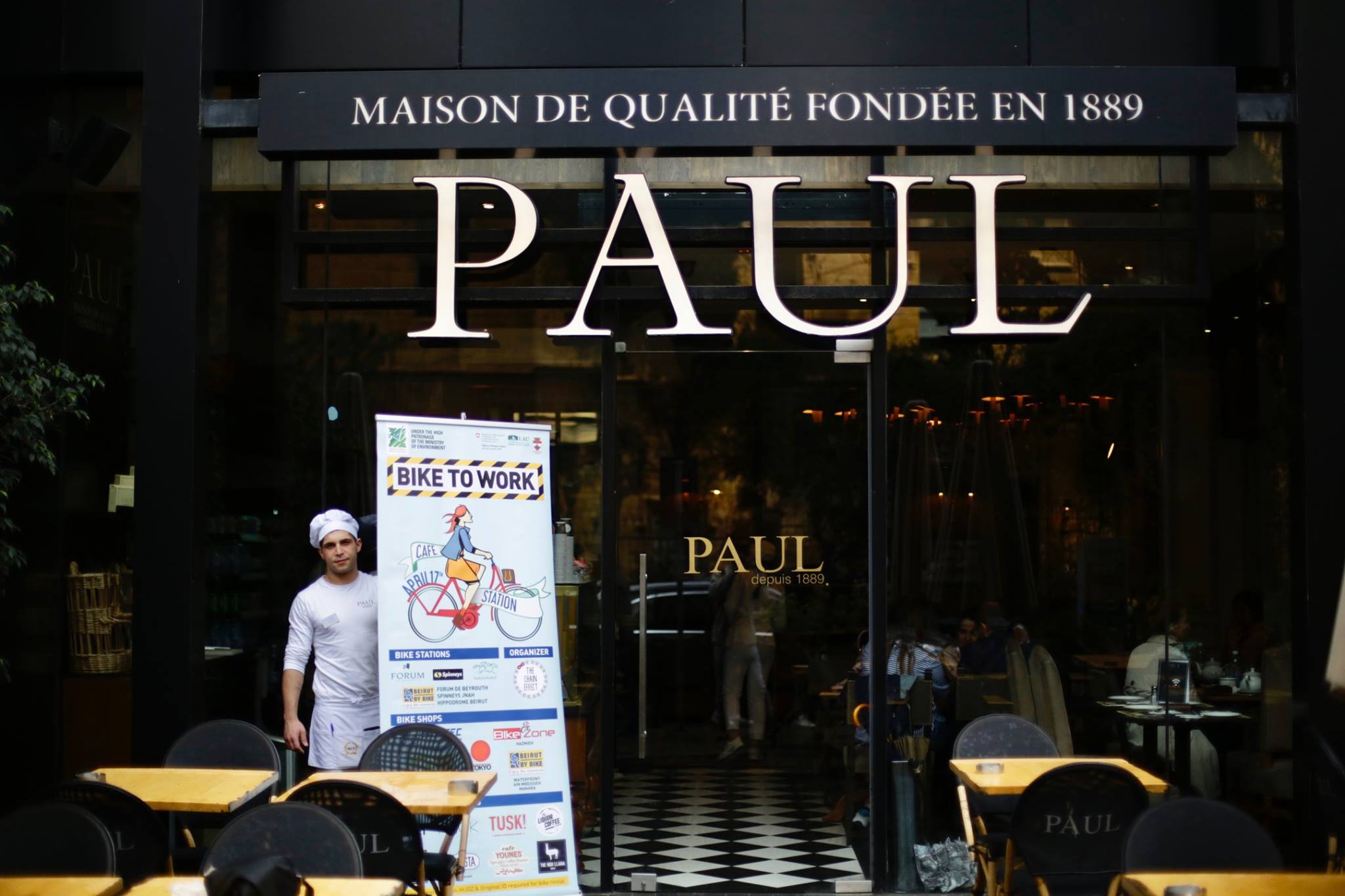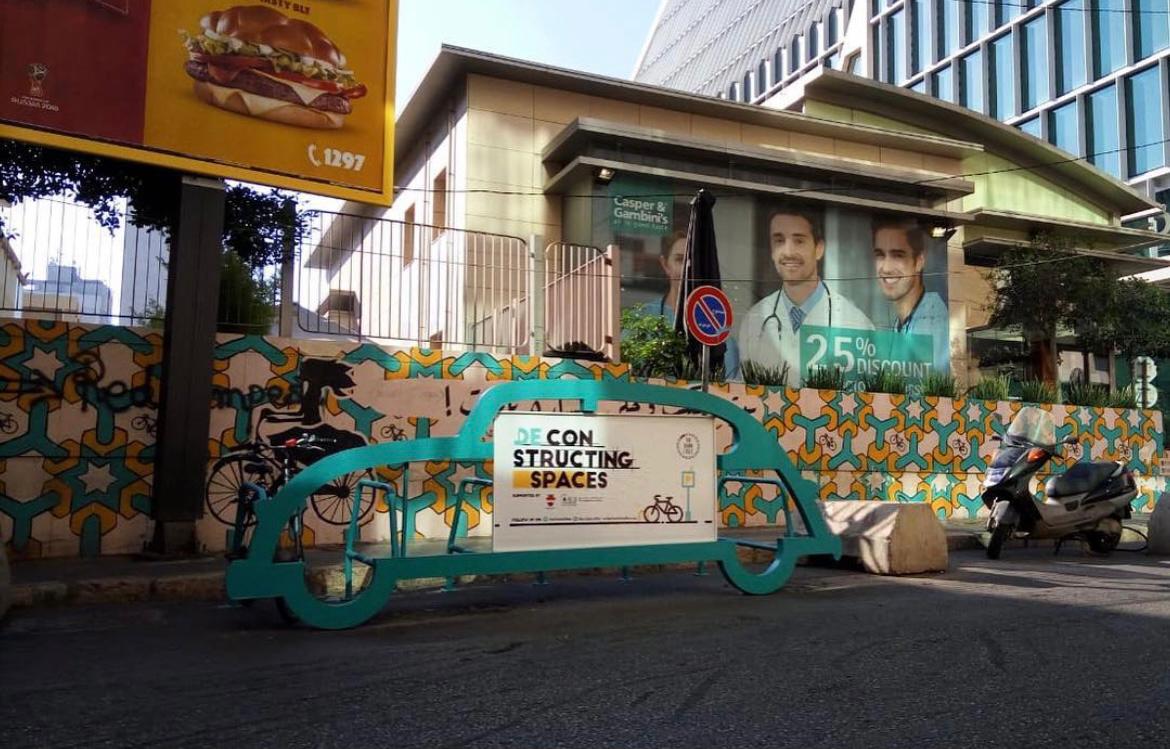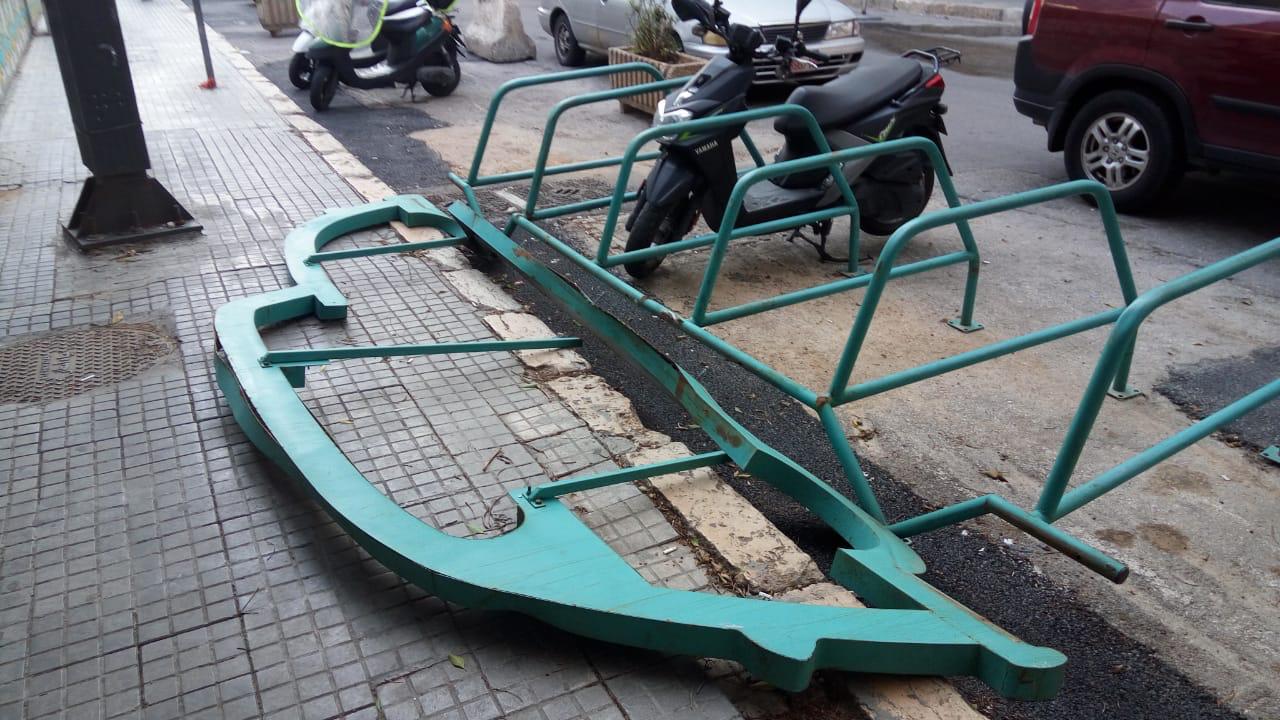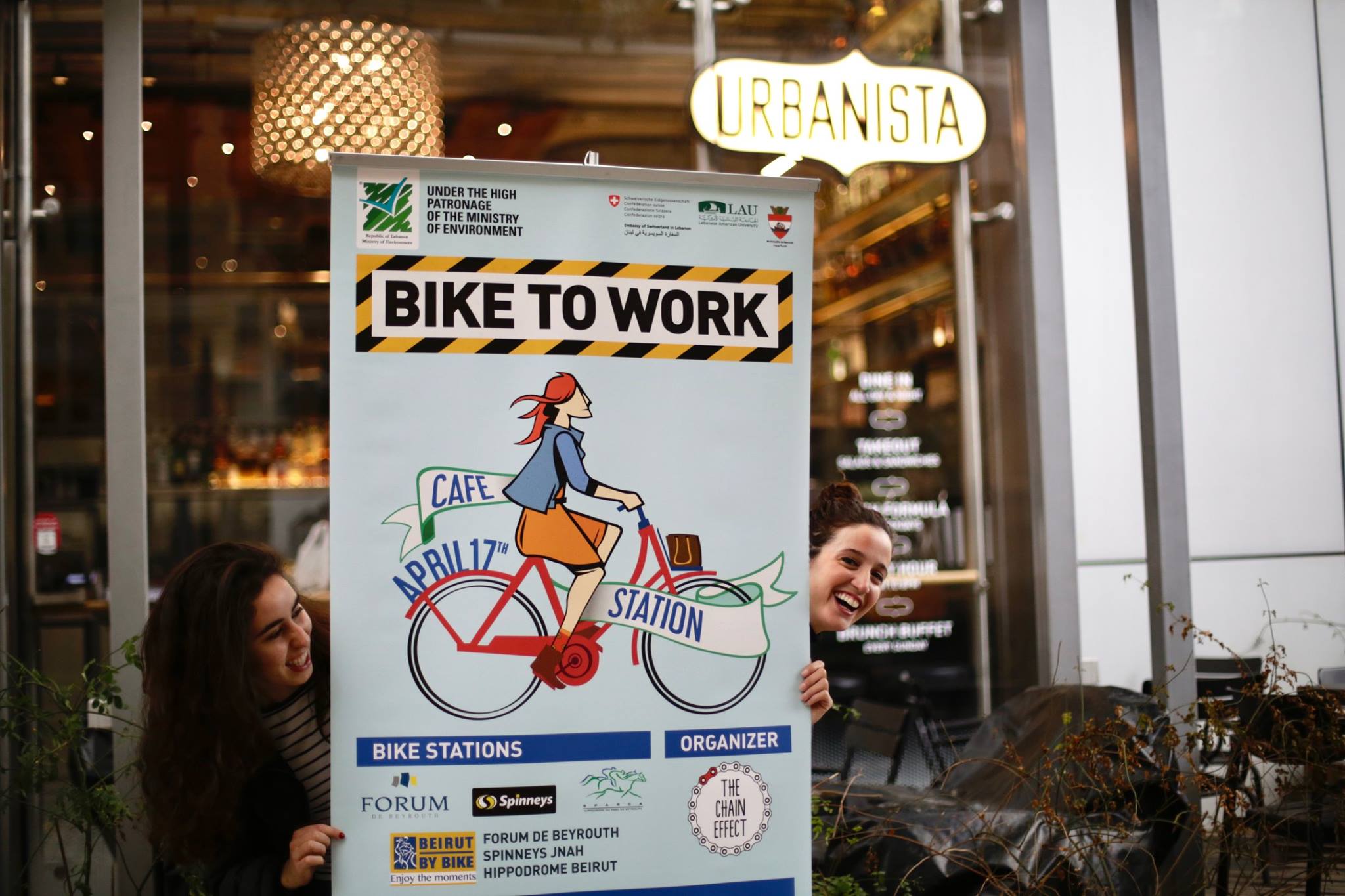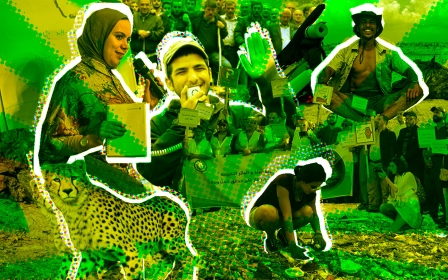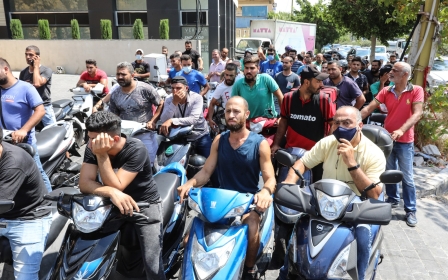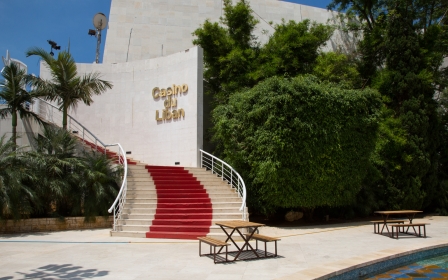The battle to make Lebanon more bicycle friendly
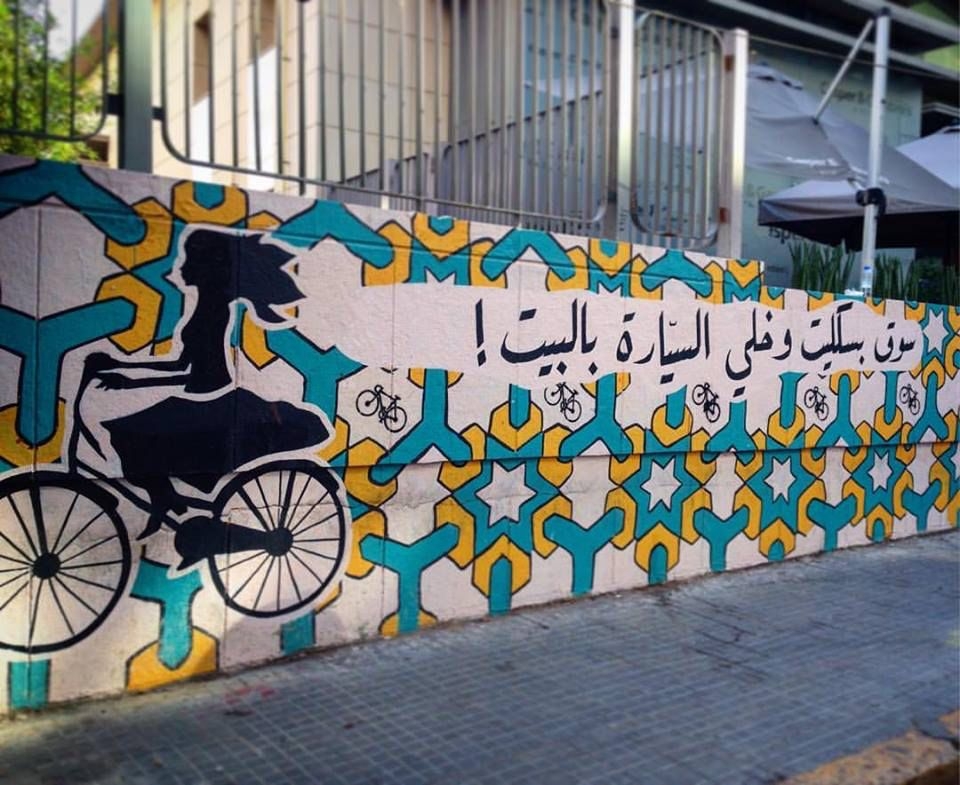
For a little over ten years, Natheer Halawani has dreamed of turning his hometown of Tripoli into a cycle-friendly city.
Although this vision may appear far-fetched in the poverty-stricken, highly-congested urban sprawl of the northern Lebanese city, its centuries-old flat streets (initially designed for horses) and short distances facilitate cycling for most community routes.
“I was lucky because the municipality is open to the idea,” the 34-year-old engineer and bicycle activist says.
Since he was appointed the bicycle mayor of Tripoli in March 2019, Halawani has led efforts to implement bike lanes, and to make cycling more widespread.
The title refers to a global initiative called BYCS, which was founded in Amsterdam and works towards creating a world where 50 percent of all city trips are by bicycle by 2030. There is a bicycle mayor in Beirut, Lebanon's capital, and in the Turkish cities of Ankara, Istanbul and Zonguldak.
Yet the Covid-19 pandemic and a series of unfortunate events coinciding with Lebanon’s unprecedented political and economic crises halted Halawani’s promising developments with the municipality.
In January, irate protesters set fire to Tripoli’s municipal palace, revolting against a strict coronavirus lockdown that made life even harder for the poor. Since then, the $10,000 in funding Halawani received for a planned cycling lane has been allocated to help those in need instead.
In addition to the delays caused by coronavirus and the burning of the municipality building, the bicycle mayor is persuading his fellow Lebanese to start using bikes as a means of transport. Where he might once have failed to convince, Lebanon’s crippling economic crisis and the continuous rise in fuel costs have made a cycling future seem more like a possible alternative today than ever before.
Eves and wheels
In 2010, an engineering professor at the Lebanese University reached out to Natheer Halawani asking him to be his cycling partner. Despite the intimidating hill that led up to campus, Halawani took on the challenge, motivated primarily by money. Cycling, after all, was far cheaper than owning a car or taking a taxi every day.
“At first, my biking stemmed from a socio-economic aspect,” he told MEE.
Shortly after he began cycling to university, he became "the cycling man", an anomaly in a country with few on bikes. Campaigning for change came naturally. One day, in 2014, while he was walking in Bab el Ramel, one of Tripoli’s most conservative neighbourhoods, he saw something that would change his perspective: a veiled woman riding her bicycle. He returned home that evening and posted on Facebook asking if anyone knew this woman, so he could later photograph her.
'Taxi drivers hate our guts as cyclists because the more of us ride, the less passengers they get'
- Natheer Halawani
Surprised, he received many responses painting a picture of a sort of unofficial community of women cyclists - both veiled and unveiled - in the city, and set out to photograph them.Within days, he had undergone a Damascene conversion: he sought to unite the cycling community.
Shortly thereafter, he started a project titled Eves and Wheels, a photographic exploration of women cycling in challenging and conservative environments. Since then, Halawani, who is now the go-to cycling contact in the northern district of the country, has photographed around 28 woman cyclists in Tripoli alone and has organised many cross-country trips by bicycle.
Things kept progressing in 2019 when Halawani was named Tripoli’s bicycle mayor, an appointment that took place after non-profit organisation The Chain Effect introduced the idea to Lebanon. In Beirut, the Lebanese cyclist and entrepreneur Philippe Dagher serves as bicycle mayor.
“The moment I became a bicycle mayor in Tripoli, I gained an unofficial authority to lobby for cycling and become an activist,” said Halawani.
Much of his work over the years has been spent debating a long list of naysayers, including taxi drivers and petrol station managers. “Taxi drivers hate our guts as cyclists because the more of us ride, the less passengers they get, the less business they have.”
Petrol station owners have also made it very clear that Halawani and his friends are not welcome. On several occasions, he has been asked to leave service stations to fill up his bike’s tires. “Even though it looks like a toxic conversation, I think it is very healthy as well - just the fact that we are starting to discuss mobility," he says.
Cycling the cause
Back in Lebanon’s capital, The Chain Effect, founded in 2014 by Zeina Hawa, Elena Haddad and Nadida Raad, has been fighting for years to promote cycling as a means of transport. The organisation is mostly concerned with “soft mobility,” which includes cycling and walking and is centered around people and the environment.
The initiative sprung from the anxiety felt by the organisers when navigating Beirut's car-jammed streets, coupled with the potential they saw for change.
Today, a person in Lebanon loses on average an hour and a half per day on the road because of traffic congestion, which costs Lebanon $3bn, or eight to 10 percent of the country's GDP. In addition, approximately 80 percent of people in Lebanon depend on private cars, and 18 percent on taxis and other car services, while only 1.7 percent use the informal bus network, and less than one percent walk or use bicycles.
“We saw how easy it is to actually move around Beirut because of how dense it is,” said Hawa in an interview with Ronnie Chatah, who hosted the co-founders on his podcast, the Beirut Banyan, in July.
Around 50 percent of trips in the greater Beirut area are less than five km. Yet the story of how cars have come to dominate the streets is a result of government incentives and state infrastructure projects. In the 1990s, the state invested tremendously in infrastructure that caters to private cars such as expanding road networks and highways. Banks also offered loans for car purchases, and the central bank subsidised 90 percent of fuel costs.
In comparison, for the past 50 years very little money has been spent on public transport and there has been no planning put in place for public transportation. According to Haddad, the lack of shared public transport was a deliberate consequence of the political choices made just before and during the civil war (1975-1990) to keep neighbourhoods and regions segregated, to maintain sectarian divides and to benefit from the economy of fuel and cars controlled by the political oligarchy.
As a result, cars - parked any which way the driver likes - rule most of the surface area of Beirut, blocking pavements and encouraging a culture where people cannot imagine alternatives.
Initially, the Chain Effect's founders wanted to spread awareness about the potential for change through street art, choosing key locations with heavy traffic congestion. In March 2015, one day before the annual Beirut Marathon, the group painted a mural in the bustling commercial district of Hamra with the sign: “If you rode a bike, you’d be there by now.”
On social media, the mural spread, sparking a conversation that had been mostly absent. Subsequently, their work moved from one wall to the next. The Chain Effect officially transitioned from street art to registering as a non-governmental organisation in 2019. In total, they have painted 40 murals around Beirut, some in English but most in Arabic.
"Since that first wall, we tried to paint all our walls in Arabic. With Arabic we reach more people and democratise the message. English is the exception." Haddad says.
A Bike to Work event launched in 2017 has also been a proud feat for the organisation. Through it, they tried to help and encourage people to commute on two wheels by providing free bicycles, setting up park and ride stations, including coffee and bites and installing temporary bike lanes so people could try to cycle without barriers.
In 2018, they also created a video titled 5 Things You Won't Face on a Bicycle!, which begins with a parody of a girl on a bicycle comically getting a traffic ticket (because this would never happen). A man and woman on their phones are shown trying to navigate Beirut traffic. The idea is that using a bicycle to get around Beirut is far less stressful than driving.
The yearly Bike to Work continued for three years, but has been brought to a halt for the last two years because of coronavirus and Lebanon's various crises.
Mired in Challenges
Despite all its efforts, the Chain Effect faces many barriers in its mission to spread cycling as a form of commute in Beirut. In a limited cycling market, the bicycle is often seen as a tool for sport or leisure rather than a viable form of travel.
On top of the accessibility issue, just like in Tripoli, the group faces behavioral and cultural issues. The car is viewed as a more prestigious form of commuting, and not owning one is perceived as a sign of regrettable poverty.
Poorly planned infrastructure, including a massive highway known as the Ring, which cuts between the popular Hamra and Achrafieh neighborhoods, also raises legitimate safety concerns. A lack of laws to protect cyclists, pedestrians, crippling infrastructure, and few road safety directives creates further tension.
“People would stop us and say ‘you’re crazy, are you trying to tell us to die on the roads. There is no safety with regards to cycling,’” Haddad said. The perception of getting around is linked to large roads and highways, which ignore smaller roads that are more cycle friendly.
Yet the group has precisely tried to overcome such obstacles by starting a conversation, advocating structural change and creatively thinking of ways to optimise what they have. For example, they created a crowdsourced map by existing cyclists in Beirut that shows bike friendly routes in the wake of the void of dedicated cycling infrastructure.
“Even when there is no dedicated plan, we can still start and lay the groundwork,” Hawa told the Bicycle Mayors network in an interview.
‘Political Inertia’
In the modern Lebanese political context, it is hardly surprising that the Chain Effect’s efforts have been hamstrung by governmental and municipal inertia, as well as a reluctance to execute promised plans.
In 2018, the group installed bicycle parking on Abdel Aziz street in Hamra with the American University of Beirut’s (AUB) Neighborhood Initiative, as part of Beirut Design Week. The Initiative was established in 2007 to mobilise AUB resources for the public good, tackling noise pollution, increasing density and congestion, lack of greenery and a lack of public space. It began in Ras Beirut, just outside the campus walls.
The installation took the shape of a car, to demonstrate how much space a car takes up on the street versus how many bikes can actually park. Last year, it was damaged by the municipality during road works and ultimately removed.
“We had to come back and reinstall it, in a way to say ‘you destroy and we create and add value to our streets,’ Haddad told MEE. “It shows how we are in constant conflict with our government.”
In April 2019, Beirut’s municipality mayor Jamal Itani announced a 16km bike lane and 14 bike share stations.
Itani made the announcement on the 2019 Bike to Work day, using the momentum of the event to hold a press conference and cycle to work with some of his colleagues, including the former environment minister, Fadi Jreissati.
The mayor said work was set to begin on the first lane over the summer and that funding, detailed design and demand for the lanes was present. Yet, two years and four months later, no sign of the lanes can be found.
“Unfortunately October 19 came and things halted a bit and then we called up the contractor to come and implement and he said due to the devaluation of the currency I am not able to do it,” Itani told MEE.
Itani further blamed the delay in implementation on “a decree from the Ministry of Interior that said that only important projects such as maintenance can be implemented.”
Since that first press conference, the Chain Effect said they repeatedly reached out to the mayor himself, his office and members of the Beirut municipal council for follow up but have not received a response.
Above all, the group believes in "tactical urbanism", a quick, low-cost, temporary change to the built environment, such as the same strategy implemented by Amsterdam protesters in the 70s to turn the city into a cycling hub so safe that even toddlers and elderly people use bikes to get around.
“There was a time when Amsterdam had more cars than Beirut but they were killing a lot of kids in this neighborhood so people rallied. They pushed their cars out of the streets,” said Haddad, who recently wrote a position paper - in English and Arabic - on “mobility justice” co-authored by Halawani, and two non-profit groups called Rider’s Rights and Train Train Lebanon. “We have to do the same thing. We have to keep lobbying municipalities and government agencies.”
'Towards mobility justice'
On the morning of Tuesday 8 July, Halawani casually rode by a line of over 200 cars queuing in what have been referred to as “lines of humiliation” at a local petrol station in Tripoli.
For months now, Lebanon has faced severe fuel shortages that have sparked long waits and plunged the country, already facing economic collapse, into darkness.
As he passed by on his bicycle, some started cheering him on, shouting, "Keep it up!"
Now, with severe fuel shortages and an economy in ruins, many Lebanese are being forced to rethink how to navigate the current mobility crisis. The declining purchasing power has also affected car maintenance, such as the ability to change tyres, oil and spare parts. In the first two months of 2021, there were no more than 62 cars bought in Lebanon, as compared to 1,876 by the same time last year.
Adding salt to the wound, on 11 August, the central bank announced that it will end subsidies on the scarce resource, which will likely send the price of petrol soaring. Both the fuel and Covid-19 crises have worked in the favour of bike enthusiasts like Halawani and the Chain Effect, pushing a number of people to convert to commuting to work via bicycles rather than queue for hours at petrol stations.
Khaled al-Omari, director of the quality control centre in the chamber of commerce, started cycling in June 2020, and has since lost 35 kilos.
“I appreciate Natheer because he gave me the ignition. I told my team today, since we have a fuel crisis, please don’t buy a car, buy a bicycle and come to your lab by bicycle.”
While Halawani’s talks with the Tripoli municipality have been fruitful, they were halted because of Covid and the burning of the municipality. Yet there are hopes that talks will renew soon.
Kamar al-Chaaban, a 29-year-old who was the first city traffic engineer for Tripoli’s municipality, worked as the lead engineer for Halawani’s bicycle lane proposal.
“I am absolutely sure that Tripolitans would take any step to enhance soft mobility especially bike lanes during these times of the fuel crisis,” she said. “I believe today is the right time and the mayor and city council are in urgent need to find new possibilities for transportation in the city.”
A tale of contemporary Lebanese history is incomplete without understanding the sectarianism that divided Lebanese neighbourhoods during and after the war until today. It is the small things - like the freedom one feels when riding a bike - that can invigorate in these chronically depressing times in the country.
“Having a bicycle can help you navigate certain areas of the city in a different way and break down these barriers that have been built up by years of conflict, civil war and fear of the other that has been used so much in politics to divide us,” said Haddad.
Middle East Eye propose une couverture et une analyse indépendantes et incomparables du Moyen-Orient, de l’Afrique du Nord et d’autres régions du monde. Pour en savoir plus sur la reprise de ce contenu et les frais qui s’appliquent, veuillez remplir ce formulaire [en anglais]. Pour en savoir plus sur MEE, cliquez ici [en anglais].


